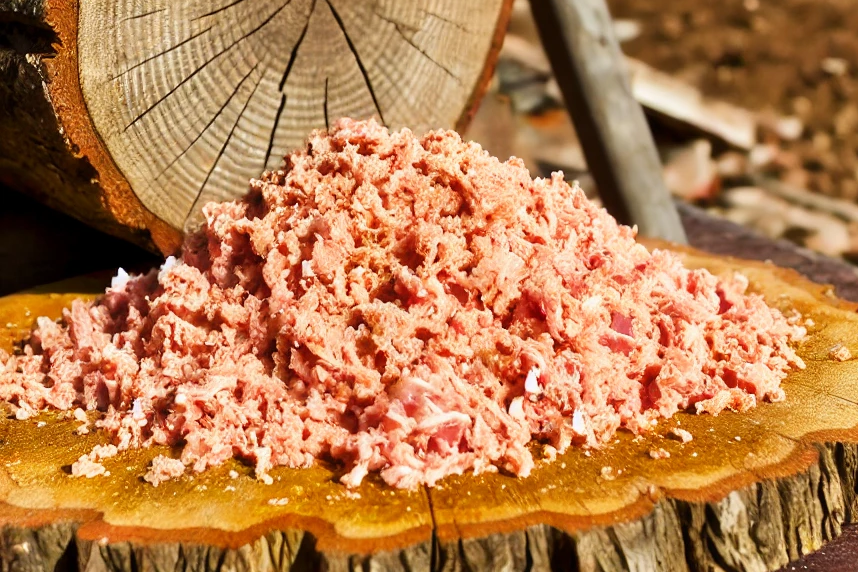Liver hydrolyzate

What is liver hydrolyzate?
Liver hydrolyzate is a product obtained from the liver of animals such as cattle or pigs. The liver is broken down with enzymes or acids to release the proteins and other nutrients. The result is a liquid or powdery substance that has a high content of amino acids, vitamins, minerals and trace elements.
Liver hydrolysate is often used as a dietary supplement for dogs as it can have many health benefits. For example, it can aid digestion, strengthen the immune system, support liver function and combat loss of appetite. In addition, liver hydrolyzate has an intense taste and smell that attracts many dogs.
What are the advantages and disadvantages of liver hydrolyzate for dogs?
As with any food supplement, there are pros and cons to liver hydrolysate that you should weigh up before giving it to your dog. Here are some of them:
Advantages
- Liver hydrolysate can improve your dog's nutrient absorption, especially if they are deficient or on a special diet.
- Liver hydrolysate can accelerate wound healing as it is rich in amino acids, which are important for the formation of collagen.
- Liver hydrolysate can improve the quality of your dog's coat as it contains essential fatty acids that ensure a shiny and healthy coat.
- Liver hydrolyzate can increase your dog's resistance to stress as it contains B vitamins, which are important for nerve function.
- Liver hydrolysate can stimulate your dog's appetite when he is sick or fussy.
Disadvantages
- Liver hydrolysate can trigger allergic reactions if your dog is sensitive to certain proteins or other ingredients. Therefore, watch out for possible symptoms such as itching, skin rash or diarrhea.
- Liver hydrolyzate can lead to obesity if you feed it in excessive quantities. This is because liver hydrolyzate is very high in calories and can exceed your dog's energy requirements. Therefore, dose the liver hydrolyzate according to the manufacturer's or your vet's instructions.
- Liver hydrolyzate can lead to an overdose of vitamin A if you feed it together with other liver-containing products. This is because vitamin A is fat-soluble and can accumulate in the body. Too much vitamin A can lead to symptoms of poisoning such as vomiting, diarrhea or bone damage. Therefore, avoid giving your dog a double dose of liver-containing products.
How to feed liver hydrolyzate correctly?
If you decide to give your dog liver hydrolyzate, there are a few things you should consider to get the best out of this ingredient:
- Choose a high quality product from a trusted source. Make sure that the liver hydrolysate is free from harmful substances such as antibiotics or hormones and that it does not contain any artificial additives such as colorants or preservatives.
- Feed the liver hydrolyzate as required and not as the main food. This means that you only give the liver hydrolyzate as a supplement to a balanced diet and not as a substitute for other important nutrients.
- Stick to the recommended dosage and frequency. The correct amount and frequency depends on various factors such as your dog's age, weight, health and activity level. Therefore, follow the manufacturer's or your vet's instructions.
- Observe your dog's reaction to the liver hydrolyzate. If you notice that your dog shows side effects or rejects the liver hydrolyzate, you should stop or reduce it.
Liver hydrolysate is a nutritious ingredient for dogs that can have many benefits. It can aid digestion, boost the immune system, speed up wound healing and stimulate appetite. However, there are also some disadvantages to consider such as possible allergies, obesity or vitamin A toxicity. You should therefore always feed liver hydrolyzate with caution and stick to the recommended dosages.
If you notice any signs of hypersensitivity or poisoning in your dog, you should see your vet immediately. We are not a substitute for a vet, but we try to be as accurate as possible. Every dog reacts differently and we recommend you get a second opinion or consult your vet if in doubt.
Stay healthy and take good care of your four-legged friend!😊
Similar to Liver hydrolyzate
Poultry liver hydrolyzate is a product obtained from the liver of poultry such as chickens or turkeys. The liver is broken down into smaller, more easily digestible components with the help of...
Chicken liver hydrolyzate is a product obtained from the livers of chickens. The liver is treated with acids or enzymes to break down the proteins into smaller fragments (peptides) and individual...
Bovine liver hydrolysate is produced through the process of hydrolysis, in which bovine liver is enzymatically broken down into smaller peptides and amino acids. This process mimics natural...
Pork liver hydrolysate is created through the process of hydrolysis, where pork liver is treated with water, enzymes or acids to break down the large protein molecules into smaller peptides and free...



